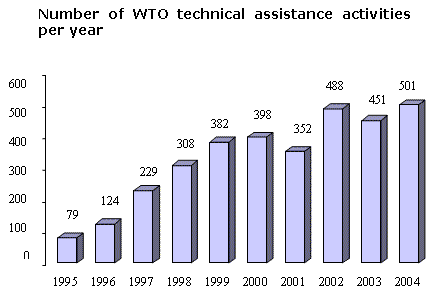- home
- the wto
- ministerials
- hong kong 2005
- briefing notes
- technical cooperation
HONG KONG WTO MINISTERIAL 2005: BRIEFING NOTES
TECHNICAL COOPERATION A joint effort to build capacity in developing countries
More than three quarters of the WTO抯 members are developing countries. Of these, 32 are least-developed. Developing countries and nations in transition from central planning require technical assistance to adjust to WTO rules and disciplines, implement obligations, and exercise their rights as members ?including drawing on the benefits of an open, rules-based multilateral trading system.
Contents
> Director-General抯 letter to journalists
> The Doha Development Agenda
> Agriculture
> Cotton
> Services
> Market access, non-agricultural products
> Intellectual property (TRIPS)
> Trade facilitation
> Rules: ad, scm including fisheries subsidies
> Rules: regional agreements
> Dispute settlement
> Trade and environment
> Small economies
> Trade, debt and finance
> Trade and technology transfer
> Technical cooperation
> Least-developed countries
> Special and differential treatment
> Implementation issues
> Electronic commerce
> Members and accessions
> Members
> Bananas
> Statistics, Textiles and Clothing
> Statistics, Facts and Figures
> Jargon buster, Country groupings
> Jargon buster, An informal guide to 慦TOspeak?/a>
Assisting officials from developing countries in their efforts to better
understand WTO rules and procedures ?and how these rules and procedure can benefit them ?is
among the most important aspects of the organization抯 work. To fulfill their
objectives, the training programmes are development-oriented, geographically
balanced and aim at impact and results.

Since the WTO抯 creation in 1995, the number of technical assistance activities has increased from 79 in 1995 to 501 in 2004, driven by rising demand from WTO member governments in the developing world.
As for the regional distribution of the technical assistance
provided in 2004, the majority of activities were held in Africa, representing
36% of total, followed by Asia and Pacific, nearly one quarter.

back to top
The Doha mandate
When WTO members launched a new round of negotiations in Doha, they acknowledged developing countries?increasing need for technical cooperation in order to allow them to participate fully in the negotiations. At Doha, donors ?developed countries and international organizations active in trade issues ?pledged to provide the needed support to developing countries.
- In Paragraph 41 of the Doha Declaration, WTO member
governments reaffirm all technical cooperation and capacity building commitments
made throughout the document and add general commitments:
- The Secretariat, in coordination with other relevant
agencies, is to encourage WTO developing country members to consider trade
as a main element for reducing poverty and to include trade measures in
their development strategies.
- The agenda set out in the Doha Declaration gives
priority to small, vulnerable, and transition economies, as well as to
members and observers that do not have permanent delegations in Geneva.
- Technical assistance must be delivered by the WTO and other relevant international organizations within a coherent policy framework.
After the adoption of the “July package”, on 1 August 2004, the training assistance agenda focused on the issues included in the document.
In 2004, donor countries maintained the target amount of CHF 24 million for the Doha Development Agenda Global Trust Fund (DDAGTF), dedicated to technical assistance and training.
back to top
Reference Centres
Since 1997, the WTO has established Reference Centres in developing countries. They provide technical facilities that enable government officials, the press, general public, businesses and academic institutions to access essential documents instantly via the WTO website. WTO provides hardware, software and training. By April 2005, 145 centres had been established in 105 countries including 47 in Africa and Indian Ocean, 21 in Asia and Pacific, 14 in the Caribbean, 8 in the Middle East, 6 in Latin America, and 5 in Eastern Europe.
back to top
Training Courses
The WTO training courses provide government officials from developing countries and economies in transition with an important foundation of knowledge in WTO matters. Many trainees have returned to Geneva as ambassadors representing their countries in the WTO. In 2004, around 228 participants attended the Geneva-based courses. Typical of this product are the twelve-week Trade Policy Courses (TPC) and the three-week Introduction Courses. Regional Trade Policy Courses (RTPCs) have also been developed since 2002.
In 2004, four RTPCs were organized: one for English-speaking Africa in Nairobi, one for French-speaking Africa in Rabat, one for the Caribbean in Kingston, and one for Asia/Pacific in Hong Kong. After three years of implementation, approximately 300 government officials have participated in RTPCs.
back to top
Geneva weeks
In its seventh year, the Geneva Week brings together representatives of WTO member countries who do not have permanent missions in Geneva. These week-long programmes cover all WTO activities and include presentations by other international organizations based in Geneva, including the International Trade Centre (ITC), the United Nations Conference on Trade and Development (UNCTAD), the World Intellectual Property Organization (WIPO) and the International Organization for Standardization (ISO). The Geneva Week usually coincides with important activities already on the agenda including preparations for Ministerial Conferences or other negotiations. Since 2002 there are two Geneva Weeks per year, and the programme is now funded by the regular WTO budget ?previously it was funded from trust fund contributions.
Other material:
> WTO assistance for developing countries
> Doha
declaration
> Doha declaration
explained
> Development
